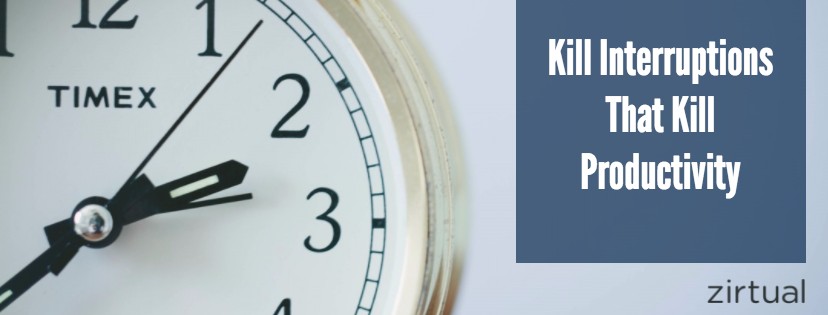Productivity is no easy feat, and that’s speaking from personal experience. I’m constantly on the go, and despite working my butt off around the clock and even sticking to a solid routine for productivity, I still have that rare day where it’s a bit of a struggle to stay productive.

It’s an unusual person who can resist the urge to procrastinate from time to time, but those moments can be overcome with some serious determination.
I recently sat down with John Rampton, founder and CEO of Due.com, a service that helps small business owners create invoices and capture payments. He is also a frequent contributor for numerous publications such as Forbes, Entrepreneur, and Fast Company. Aside from a hectic conference schedule, he’s also a family man. If anyone understands the need for managing countless tasks while staying productive, it’s John.
Our interview and the methods John uses to keep his team (and himself) productive made me think about the opposing forces that both drive us to be productive and encourage us to shut down at the worst possible times.
Most importantly, I wondered, how can we overcome productivity issues and stay on track?
People Naturally Hate Being Unproductive
The Zeigarnik Effect is based on research from Soviet psychologist Bluma Zeigarnik. Her studies found that our brains send signals to pester the conscious mind when we start a task but leave it unfinished. Her theories stated that, as humans, we can’t just ignore or forget about incomplete projects. We’re naturally driven to go after goals once we’ve begun, but once we finish, our memories might have a harder time remembering the small details of the project.
Her theories were confirmed in 1992 by two psychologists who discovered that these signals and subsequent feelings of restlessness or unease could only be eliminated when the task was completed.
This means that the best way to accomplish anything is to just get started. Once you start working on something, your brain is hardwired to finish it, whether through positively motivating you or bothering you all the way to the finish line.
This doesn’t mean that interruptions don’t ever crop up and drag down your productivity. John faces these issues on a regular basis, so I wanted to know how he deals with interruptions and schedule changes that prevent him from getting work done.
“I don’t really deal with it, I just focus on what I need to do to get it done,” he said. “I try to minimize things that take too much time. For instance, in the last six months, I’ve tried shortening conferences as much as possible. I’ll go when it begins and then fly out early, so I don’t lose a day traveling there and a day traveling back. I’m also scheduling fewer conferences than I used to, and I try to attend more local events. When I schedule a conference, I block out an entire day so it’s blocked for that and nothing else. Then I’ll fit everything else into the available timeframe around it.”
Delegate Often and Trust Your Staff

Since interruptions are bound to happen, it’s a good idea to avoid trying to do everything on your own. Entrepreneurs often want to singlehandedly take on the world, but the more you do, the more unproductive you are overall. Don’t trick yourself into thinking you’re the exception to the rule that humans can’t actually multitask.
Instead, learn to delegate many tasks on a regular basis. You should train the people who work for you to handle virtually every aspect of your job. Then, if need be, they can run at peak efficiency even if you’re absent.
“I try to delegate everything,” John said. “Sometimes, I have to go to a conference that lasts for days on end and I can’t have people waiting on me to return to finalize decisions. Anything I can do, I make sure there’s someone on my team who’s trained to do it. There’s someone on my team I trust to handle virtually every aspect of my job.”
But this also requires having a high level of trust in your employees.
“The people assigned these tasks are trustworthy, and I’ve had a personal assistant for a very long time,” he continued. “I recommend adding people like that to your team. Having people who know me and understand everything about me makes it easier to get things done without question. That doesn’t develop overnight; it took a few years to develop that trust.”
Supercharge Your Productivity with Short, Scheduled Bursts
Staying productive doesn’t necessarily mean subjecting yourself to 16 hours at the forge and refusing to leave until the work is done. That’s something entrepreneurs and founders should realize early on: the work will never be done.
Instead of barreling toward the finish line at top speed, complete smaller goals, lap by lap. This will allow you to divide your day into manageable tasks and prioritize what needs to get done.
“I wake up at about 5:30/6 a.m. and spend about 30 minutes on email before I shut down emails for a while. Then I hit the gym for an hour,” said John. “Once I’m at the office, I typically block out three hours of work where no one bothers me. That’s when I do everything I need to get done for the day. I find that a three-hour window is perfect for this. The rest of the day is prioritized and broken into employee chats, podcasts, and meetings.”
An important thing to remember is to not let work overwhelm you. Not maintaining a good work/life balance can eat away at your ability to focus and lead to burnout. We have a limited supply of willpower, and if you push too hard for too long, you’ll deplete that without giving yourself time to recharge – then, everything will suffer as a result. There comes a point when you need to disconnect every day and shift your priorities to maintain both your sanity and your productivity.
“My main priority is family,” John explained. “At 6 p.m., my laptop and phone are shut off. I have dinner with my family and put my daughter to sleep. I prioritize that over everything and always make it my goal to be home by 6. Family comes first as often as possible.”
Kill Interruptions That Kill Productivity

Since our brains thrive on completing tasks, it’s especially important to avoid small, mindless tasks that offer mental rewards like dopamine (which brings temporary happiness). Little things like social media and answering emails can trick your brain into thinking you’ve accomplished some tasks, when in reality, you haven’t done anything but waste time.
A study from Yale psychologist John Bargh and his associates proved this in 2001: your brain will refocus if you shift to mindless tasks. Once those tasks are complete, your brain rewards you by reducing feelings of uneasiness.
Have you ever struggled with a looming project or deadline, and in that moment, you decided to clean your whole office or organize something instead? The satisfaction you derive from distractions squelches anxious feelings without really accomplishing anything useful. That’s why it’s important to will yourself to overcome those urges.
The easiest approach is simply limiting the possibility of distractions so you can stay focused. John uses this tactic companywide at Due.
“We have silent Tuesdays and Thursdays at my company,” he said. “This is when we limit communications and everyone goes dark. Then no one has to worry about intrusions. Our programmers can just focus on work and know they won’t have to respond to a ton of emails during the day. My CTO won’t even email me except for maybe a recap at end of day. We don’t even schedule meetings on those days! That makes us all more productive as a team.”
Leverage Productivity Tools
Trying to keep up with everything you need to do on your own will tax your brain and result in stress, especially if you end up missing something. It’s also harder to manage your schedule, stay productive, and eliminate unnecessary interruptions if you don’t keep detailed tabs on what needs to be done.
Fortunately, there’s no shortage of productivity apps and tools, many of which are useful for entrepreneurs. You don’t need to load yourself up with Batman gadgets to stay productive, however. Treat productivity tools like any other business equipment or process: use only what you need to work efficiently. Dump everything else that wastes time.
“My iPhone is my standard tool,” explained John. “I’ve found that I use several apps for a few weeks, then just stop using them. One app that I use a lot and have come to rely on is Calendly to book meetings. I give people a link to the calendar and they can pick from open schedule times to book a time with me, then it syncs with my calendar.
“I used to spend way too much time on scheduling, but Calendly has been great. It eliminated those back-and-forth conversations when someone wanted to meet with me and I’d check my schedule to suggest eight different available times. Then there would be more emails about times that didn’t work, what was ideal, etc. It’s a nightmare, especially when you have eight people with different schedules who are trying to fit in conference calls. That app has saved me a lot of time.”
Whether you need something like Asana for compiling to-do lists and tracking projects, social media management tools, or scheduling with Calendly, try out a variety of tools to find the best ones for helping you focus and stay productive.
Time to Focus
If productivity is an issue for you, there are plenty of ways to change your approach. The tips and examples in this article can be applied right away, and then routinely practiced to form habits that will ultimately boost your ability to stay on task under pressure. No task is too small to incorporate into your daily routine.
When it comes time to really focus on a big or urgent project, nothing will help you conquer it more than the well-versed practices and habits you’ve built up along the way.
What’s your secret to staying productive when your motivation is stagnant and interruptions keep cropping up? Do you use any of these tips? Share your routine with me in the comments below:
Find this article helpful?
This is just a small sample! Register to unlock our in-depth courses, hundreds of video courses, and a library of playbooks and articles to grow your startup fast. Let us Let us show you!
Submission confirms agreement to our Terms of Service and Privacy Policy.
No comments yet.
Start a Membership to join the discussion.
Already a member? Login